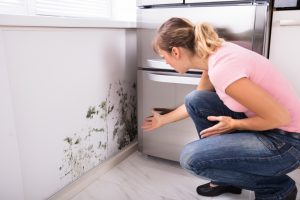
Moisture in the house causes all sorts of problems. It damages your home in multiple ways and can cause health problems through mold growth, bacteria, odor production and even insect infestations.
It’s essential that you keep your humidity and moisture in your home at normal levels. Too much or too little humidity will be unhealthy for you and your family.
Ahead, we’ll take a look at the damage humidity, and moisture can cause in your home, so you know why it’s so important to avoid excess moisture.
Moisture Destroys Wood
Wood floors and woodwork will warp after prolonged periods of excess humidity in the house. You can probably already see the effect that excess moisture has in a house that’s been around for a while.
The wood in your home will start to absorb moisture, causing it to separate from the wood around it. Walls will start to show gaps, and floors will begin to bend. This will affect the aesthetic and the value of your home.
Mold Growth
High humidity in the house will undoubtedly begin to attract mold growth. The short and long-term health effects of mold can be debilitating, especially for those with a mold allergy.
Mold loves moisture and high humidity, and too much moisture in the house is a breeding ground for mold. It’s essential to hire a professional to complete a mold inspection if you think your house might be experiencing mold growth.
There are several horror stories out there about families who didn’t realize their home was infested until too late. Try to take preventative measures by keeping excess humidity and moisture out of the home, and regularly check your home for signs of mold growth.
Insect Infestations
Mold isn’t the only home invader that loves the humidity. Insects thrive in humid conditions as well. Dust mites, for example, will enjoy a humid house.
You can eradicate these insects by simply adding some dry air to your home. Appliances like air conditioners and dehumidifiers can help draw the moisture out of the air and make your home hostile to these insects.
Electronic Damage
Not only will moisture and humidity cause damage to the structure of your home – it will start to degrade your belongings inside your home as well.
Electronics are on the front-lines of this moisture battle. Temperature change and moisture increases can cause your electronics to short circuit and break, making them unusable.
Book Damage
Electronics aren’t the only belongings in your home that will receive damage from moisture and humidity. Old and weathered books will become all but useless after exposure to excess moisture.
The fragile pages of these books will absorb moisture, which damages them further than they already might be. You can’t expect these books to last very long in moist conditions. We will many times come across entire bookshelves that are covered with mold colonization due to high humidity within the home. Books contain food sources that mold loves to feed on.
The Damage of Moisture in the House
Excess moisture in the house causes damage to the structure of the home, the residents of the home, and many of the belongings you may have.
Stay on top of the moisture and humidity levels to prevent harmful mold growth and to keep your belongings safe. Simple moisture monitoring devices can be helpful in checking the indoor humidity levels. Using exhaust fans during times of cooking and showering are also very helpful to remove humidity from the home. If you experience a water leak, please dry up the moisture as soon as possible as mold can develop within 24-48 hours, given the right conditions. The use of air moving devices, fans, and dehumidifiers and can very helpful in drying out your home to prevent mold growth.
Poor exterior home conditions can also be a cause of excess moisture within the home. The lack of roof gutters can lead to water intrusion and pooling moisture around the foundation. Poor exterior stucco or wall paint can also lead to water infiltration. Always replace damaged caulking around windows as this can lead to leaks and moisture damage inside the house.
Are you worried that you might have mold growth in your home from too much moisture? Take a look at our blog for more helpful articles on the topic.
